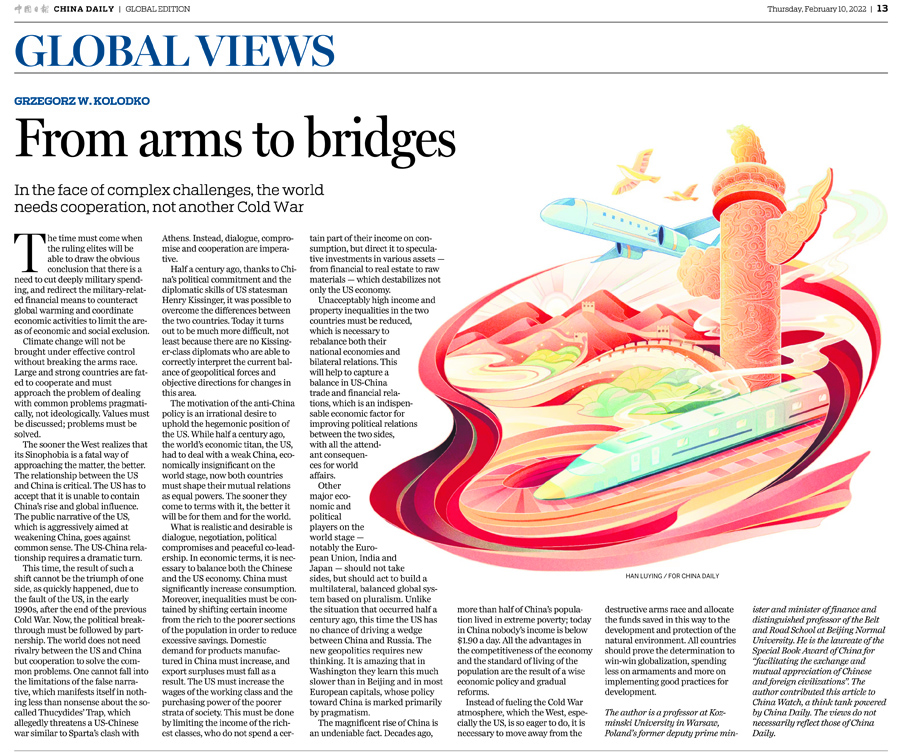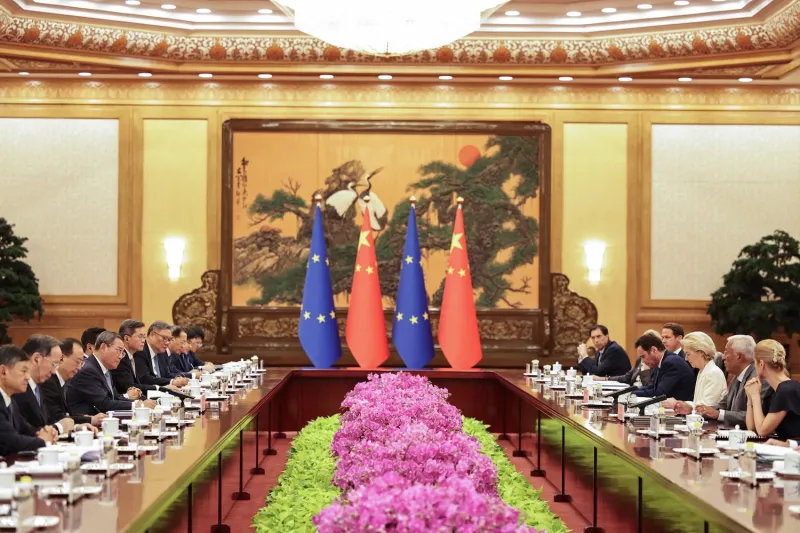Grzegorz W. Kołodko: From arms to bridges
February 10 , 2022By Grzegorz W. Kołodko, CCG International Advisor, Former Polish Deputy Premier.
The time must come when the ruling elites will be able to draw the obvious conclusion that there is a need to cut deeply military spending, and redirect the military-related financial means to counteract global warming and coordinate economic activities to limit the areas of economic and social exclusion.
Climate change will not be brought under effective control without breaking the arms race. Large and strong countries are fated to cooperate and must approach the problem of dealing with common problems pragmatically, not ideologically. Values must be discussed; problems must be solved.
The sooner the West realizes that its Sinophobia is a fatal way of approaching the matter, the better. The relationship between the US and China is critical. The US has to accept that it is unable to contain China’s rise and global influence. The public narrative of the US, which is aggressively aimed at weakening China, goes against common sense. The US-China relationship requires a dramatic turn.
This time, the result of such a shift cannot be the triumph of one side, as quickly happened, due to the fault of the US, in the early 1990s, after the end of the previous Cold War. Now, the political breakthrough must be followed by partnership. The world does not need rivalry between the US and China but cooperation to solve the common problems. One cannot fall into the limitations of the false narrative, which manifests itself in nothing less than nonsense about the so-called Thucydides’ Trap, which allegedly threatens a US-Chinese war similar to Sparta’s clash with Athens. Instead, dialogue, compromise and cooperation are imperative.
Half a century ago, thanks to China’s political commitment and the diplomatic skills of US statesman Henry Kissinger, it was possible to overcome the differences between the two countries. Today it turns out to be much more difficult, not least because there are no Kissinger-class diplomats who are able to correctly interpret the current balance of geopolitical forces and objective directions for changes in this area.
The motivation of the anti-China policy is an irrational desire to uphold the hegemonic position of the US. While half a century ago, the world’s economic titan, the US, had to deal with a weak China, economically insignificant on the world stage, now both countries must shape their mutual relations as equal powers. The sooner they come to terms with it, the better it will be for them and for the world.
What is realistic and desirable is dialogue, negotiation, political compromises and peaceful co-leadership. In economic terms, it is necessary to balance both the Chinese and the US economy. China must significantly increase consumption. Moreover, inequalities must be contained by shifting certain income from the rich to the poorer sections of the population in order to reduce excessive savings. Domestic demand for products manufactured in China must increase, and export surpluses must fall as a result. The US must increase the wages of the working class and the purchasing power of the poorer strata of society. This must be done by limiting the income of the richest classes, who do not spend a certain part of their income on consumption, but direct it to speculative investments in various assets-from financial to real estate to raw materials-which destabilizes not only the US economy.
Unacceptably high income and property inequalities in the two countries must be reduced, which is necessary to rebalance both their national economies and bilateral relations. This will help to capture a balance in US-China trade and financial relations, which is an indispensable economic factor for improving political relations between the two sides, with all the attendant consequences for world affairs.
Other major economic and political players on the world stage-notably the European Union, India and Japan-should not take sides, but should act to build a multilateral, balanced global system based on pluralism. Unlike the situation that occurred half a century ago, this time the US has no chance of driving a wedge between China and Russia. The new geopolitics requires new thinking. It is amazing that in Washington they learn this much slower than in Beijing and in most European capitals, whose policy toward China is marked primarily by pragmatism.
The magnificent rise of China is an undeniable fact. Decades ago, more than half of China’s population lived in extreme poverty; today in China nobody’s income is below $1.90 a day. All the advantages in the competitiveness of the economy and the standard of living of the population are the result of a wise economic policy and gradual reforms.
Instead of fueling the Cold War atmosphere, which the West, especially the US, is so eager to do, it is necessary to move away from the destructive arms race and allocate the funds saved in this way to the development and protection of the natural environment. All countries should prove the determination to win-win globalization, spending less on armaments and more on implementing good practices for development.
From China Daily, 2021-2-10

Topical News See more






